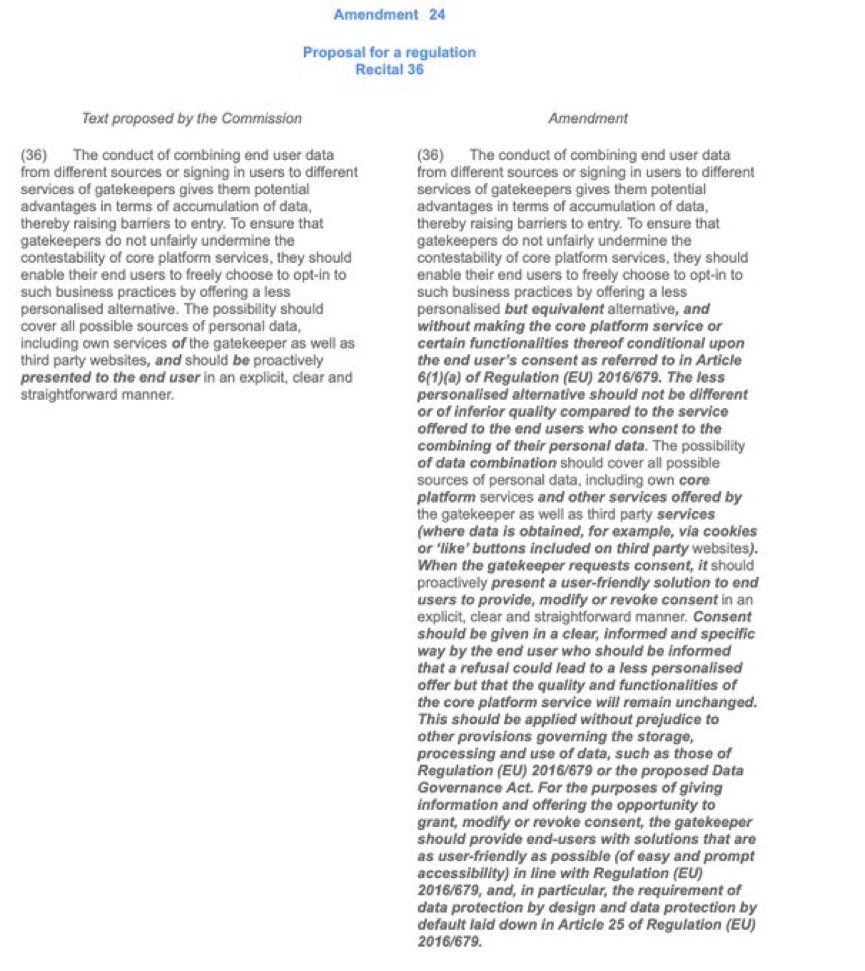The key? You must provide the option to produce gasoline that doesn’t burn

22 February 2022 (Berlin, Germany) – The Digital Markets Act (DMA) is a legislative proposal of the European Commission that intends to ensure a higher degree of competition in the European Digital Markets, by preventing large companies from abusing their market power and by allowing new players to enter the market. It establishes a list of obligations for designated “Gatekeepers” and in case of non-compliance, there will be enforced sanctions mechanisms, including fines of up to 10% of the worldwide turnover.
This regulation targets the largest digital platforms operating in the European Union. They are called “Gatekeepers” in the Act due to their “durable” market position in some digital sectors and because they also meet certain criteria related to the number of users, their turnovers, or capitalisation. And those “Gatekeepers”, of course, are “Big Tech” or “GAFAM” – Google, Amazon, Facebook, Apple, Microsoft. They are the sole subjects of the act.
Ok, allegedly not the only ones – but who is kidding whom. According to the European Commission’s own press releases and interviews with Commission staff, the main objective of this document is to regulate the behavior of the Big Tech firms within the European Single Market and beyond.
The DMA sets up an ex-ante regulatory framework complementary to, yet also fundamentally different from, existing EU competition law provisions. If adopted, it would contribute significantly to shaping the EU’s particular approach to digital markets regulation. But, my God, there is an elaborate, complex administrative sanctioning and judicial review framework and as one starts to slice and dice the Act one realizes – yet again – the Commission failed to employ anybody who knows how tech works.
I’ve been in Berlin to work on my Holocaust movie (we are filming at the Topography of Terror, and then at Auschwitz this coming weekend) but I am also here as a legal advisor to the media company assisting on my film, helping them navigate the DMA.
I just do not know where to start with this one so perhaps it’s best to just note one glaring example (of soooooo many) and let you look at Recital #36:
(36) The conduct of combining end user data from different sources or signing in users to different services of gatekeepers gives them potential advantages in terms of accumulation of data, thereby raising barriers to entry. To ensure that gatekeepers do not unfairly undermine the contestability of core platform services, they should enable their end users to freely choose to opt-in to such business practices by offering a less personalised but equivalent alternative. The less personalized alternative should not be different or of degraded quality compared to the service offered to the end users who provide consent to the combining of their personal data. The possibility should cover all possible sources of personal data, including own services of the gatekeeper as well as third party websites, and should be proactively presented to the end user in an explicit, clear and straightforward manner.
So, if I understand this correctly, the current draft of the DMA requires any service with personalisation to offer an alternate that is not personalised … and that is not different. So you need an option to turn off personalisation – without turning it off.
Ok, I get it. And cynic though I am, I believe certain chunks of tech do need regulation and they will get regulation, yes. But there is something depressing in an amendment not just being proposed but actually approved that demands we produce gasoline that doesn’t burn. Which is the proper analogy here.
But how do we fix a regulatory process that asks for a product that is personalised and a product that isn’t personalised – to deliver the same quality of experience? How in hell does that get approved? Personalisation means Facebook shows posts from your closest friends first. It means Instagram can suggest other posts you might like. It means Amazon can show products related to your recent purchases. You can ban that. But you can’t turn if off – and yet still have it.
Now, to be fair, revisions have started (Commission insiders tell me it will take years to get DMA finalised) and the following draft version is both clearer and technically feasible – turn off the ecombination of data from separate sources, producing less relevant ads and less relevant personalisation – but it still wants that to happen without anything actually changing. How?

I know what the drafter meant to say. That you should be able to view Instagram posts without allowing Instagram access to everything you’ve ever posted on Facebook. Or use Facebook without them storing details of what you’ve visited on some unrelated medical website. That doesn’t seem unreasonable.
Unfortunately, that is not what it does say. This says that the newsfeed must contain posts from your interests without knowing what your interests are.
“Personalisation” means Facebook shows posts from your closest friends first. It means Instagram can suggest other posts you might like. It means Amazon can show products related to your recent purchases. You can ban that but you can’t turn if off – and yet still have it.
But that also takes down the path of malicious compliance that we have seen with cookies and GDPR and time prevents a continuation of the topic.
Advice? If the DMA falls into your bucket-of-stuff-I-need-to-get-a-handle-on then get good, very competent counsel because the DMA is yet another clusterfuck. It’s still waaaaay down the road before the final gate. But track it, because you never want to face the Commission alone …
